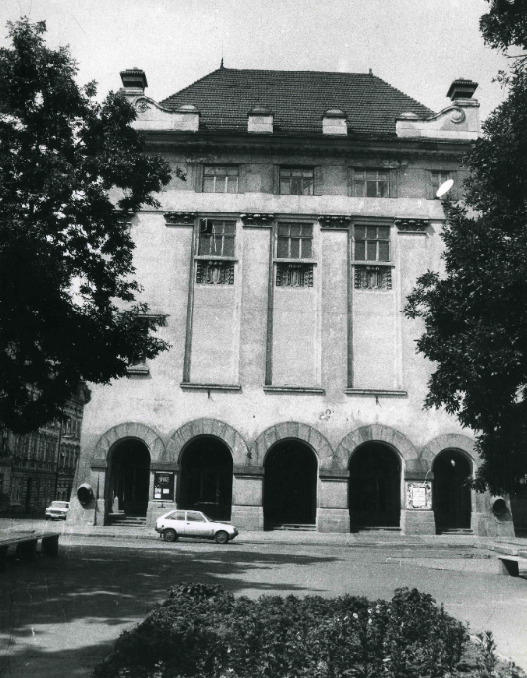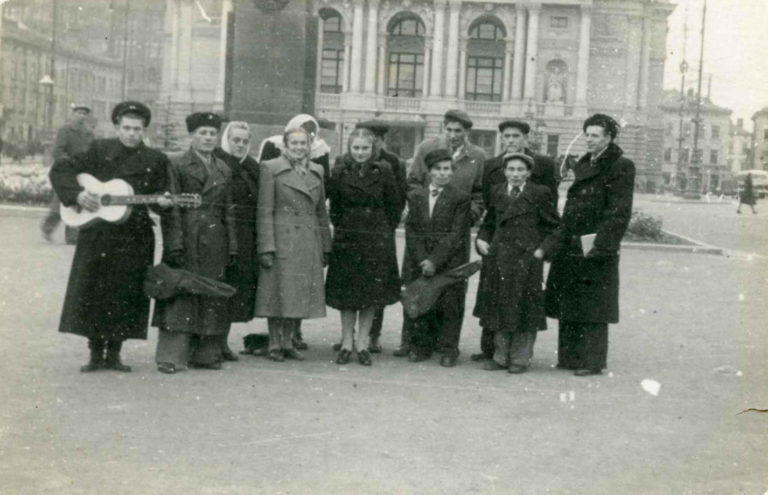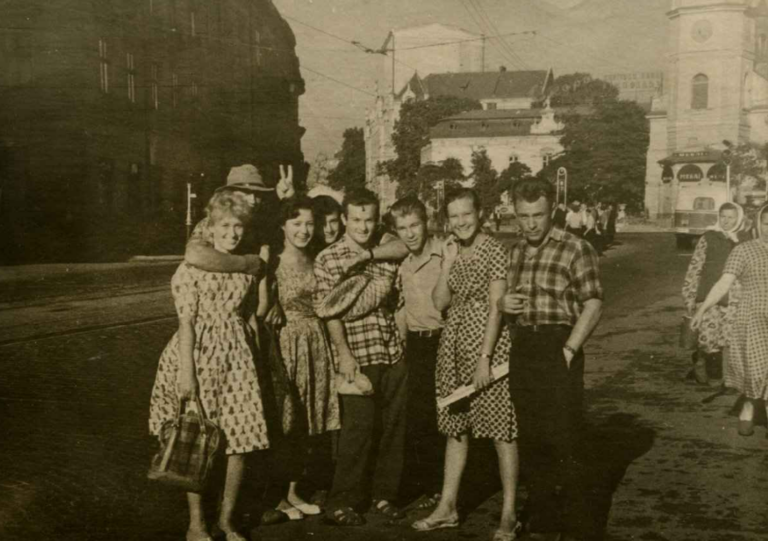І: Tell us how you became interested in theater.
Р: I was interested in theater from my childhood, since when I went to school I was in a drama group. I took part in that and always had the desire to be an actress. So, we were living in Kalush, my father was military and they had sent him to Kalush. And it’s there that the war started. In ‘41. At 4am. We thought that this was military exercises—because there was a garrison there—and then, after a few hours a soldier comes running up and tells my father that the war has started and that he needs to go to the headquarters. Well, and basically, it started here. On the second day our family—there were five of us children—I am the oldest, it’s true. And so they somehow sent us all to the rear—all the way to Russia. We were traveling for almost a month in whatever way we could: on a freight train, and on this, and on that, to get to the Motherland, where my mom was. My mom was Russian and my father Ukrainian. That’s how it was. And we somehow got ourselves there. Well, and we, that is, we lived there. And from there I volunteered up for the front. Well, how could I not? We were komsomoltsy after all—to defend our Motherland. Here, I have a document, I can show you. Here, [it says] that I voluntarily went to the front. Well on the front we were in Stalingrad already on 1 April 1942. There were several of us volunteer girls. And all the girls were in one regiment. So, and May 1 1942 we had already taken our military oath. They taught us communications, I was a communications operator. So, we repaired the communications in the field – here you have a line on the street, by a tree, by a wall. It gets torn, so—I’m already going there, crawling, when the fighting is already, you know, the battles are already going on, I had to crawl on my knees. And I’m thinking: “My god, at least may I not get to the Germans,” before I find that torn line. And we had a little kind of reel and on this reel was telephone wire…[and they used that wire to fix the field communication lines]. And the telephone—the telephone was in a wooden kind of box. The wood was so thin, if I find the broken communication line, I had to call immediately and say: “I found it, found, found it, and now I will re-connect this line”…
So I will never forget, when Hitler threw 2000 airplanes at Stalingrad. I was right then at my post, it was sometime during the day—sometime around 4pm. I hear this sound of planes, I look in the binoculars, I look from the southwest, I transmit: “From the west some Heinkel, from the East – Messerschmitt,” and the commander runs up: “What’s she saying? What are you saying?” – seizes these binoculars, looks and, in fact: from all sides there are these bomber planes, and he claps me on the shoulder and says: “Good job! That’s how you stand your ground!.” And so I’m standing there and I’m thinking—and my legs are trembling, my knees are shaking and the binoculars are shaking—and I’m thinking: “But I cannot leave my post. They’d shoot me immediately. What does that mean?” Well, I did not walk away of course, from my post, but basically all this oil spilled into the Volga, right on the water, and so on the water right in the Volga it was burning. Stalingrad was built itself along the Volga river. Well, of course, that was terrifying. There was only fear, but you see, we stood our ground. We stood our ground, of course, many people died, so many people. But I never, of course, will forget when the prisoners of war, when the battle of Stalingrad was over, when the prisoners walked, these Romanians, they were dark and it was February, the frosts were the most terrible, and they were covered with some kind of like rags or what everyone made blankets from, covering themselves with their drooping heads. And in front was Paulus, who had commanded them, and some of these most important military leaders—and these soldiers were behind them. They ordered us not to yell at them, not to talk with them in any way: “Just look, please, look or walk away.” Well and they were led of course by our Red Army men with weapons on their arms. They were so unfortunate, their heads lowered—for us this was the great victory. And so February 2, 1943—it was our victory. This we celebrated! They also congratulated me—they sent me from Stalingrad.
І: And how old were you when you went to the front?
Р: I was born in ‘23. I was not even, wait, was I 18?
І: You were.
Р: I was already 18. So that’s that. Well and then, we, you know, our troops had already set off for Kharkov. Kharkiv we held all of February—we held it only one month. And then the Germans took it again, and only 23 August, I will never forget. 23 August 1943—about five months or half a year had gone by—we just then took back Kharkiv and of course, we never gave it back again. And our troops did not retreat any more…And so we took Poltava. Basically, that’s how we got there, and Kyiv, all of Ukraine, the First Ukrainian Front – our regiment was a part of it. And so the First Ukrainian Front – it went to all of Ukraine, and Kyiv was already ours, already we left almost nothing. Because already then in Siberia—there military factories were working for the front, that’s how it was. And we already had our own military accessories: machine guns and tanks, and oh my god. That’s how it was. And Lviv, soon we will celebrate Lviv. Our regiment, – also ours – freed Lviv from the fascists. Although somehow they say that some other people liberated, I don’t know how much they liberated. I remember how we entered Lviv, and how by the Opera the people met us, they were crying, they were even crying, Oh my god, they were hugging us. That’s how they met us, like that.
І: And what year did you come to Lviv?
Р: Huh?
І: What year did you get to Lviv?
Р: To Lviv? In, on – 27 July 44. And so they also always congratulate me. Because they have these lists—which regiments liberated the city of Lviv. So.
І: And you decided to stay in Lviv?
Р: Yes. And so I stayed in Lviv, and already it’s almost Victory Day. And then it’s already Victory Day, – 9 May 45– and Victory Day has passed, and they’re still keeping me, because I still have the military identification. And it’s written there: “Registered,” because non-commissioned officers and people who…. Communications, signalmen, signalers—they were always registered. It’s that kind of job—signals—and so even now it’s written that I am registered as a communications operator, and the fact that they took me off the list in 1958—I think that’s when they took me off the list—they never wrote it down here. So I’m still connected. (laughter). That’s how it is. … May 9 [Victory Day] had passed, and they still weren’t letting me out [of the army], because, well, I don’t know, it’s their business of course. Well, and then I see—an announcement. An announcement, but I am in military uniform, still serving. An announcement for a theater studio under the Maria Zankovetska theater [in Lviv]. And they [the theater company] had already arrived, they were already working, and they were organizing in the summer a theater studio, but how? How could I? I had so dreamed of being an actress, but, by the way, in Stalingrad I had a, what happened was that I stopped hearing…for ten days I couldn’t hear anything….Oy what is it called, my god?…
І: Concussion?
Р: Huh? I couldn’t hear for ten days.
І: Aha. You were just deaf?
Р: Yes-yes. It was in Stalingrad. And I’m: “How is this possible – I can’t hear for how many days?” They moved me to working in the kitchen, of course. I could not do signals, I had to talk on the telephone, and I don’t hear a damn thing. I think: “My god, I won’t be an actress. What will happen?” And so these ten days. Then suddenly a pot falls and I say: I heard something, something’s not right. And I look—and a pot fell. Did I think I heard it, or was it real? But I look—it’s real. I think: “Maybe.” And I began, little by little, I started to hear. Well and of course they took me into signals.
Well, and so I decided to apply to this theater studio—and I applied. And I’m thinking: “They take me, or they don’t take me—I don’t have anything, I’m living in the soldiers’ dormitory.” So. And I think: “Okay, what will be will be.” Then suddenly there arrives, some time at the end of August, I think, a little postcard, that I am accepted. Well, my application was accepted, that I had to take tests and this and this date. Oy, my god, I had to quickly prepare and it was written there: “You have to learn a verse, and….”
І: A fable, probably.
Р: Yes. Well, so I was basically prepared and I come to the theater—it’s already written when they are starting [the course]. I come to the theater, and they are looking at me, and why are they looking at me?—I had come in my military uniform, in tarpaulin [military leather] boots, in my little hat. And they are thinking: “Why did she come in these clothes?”, but I had nothing else. And Romanytsky, a People’s Artist of the USSR, he was sitting right behind the table, and he says: “Well, kid, now we will dress you.” And he calls for, he calls for someone, well, some kind of someone: “Get me a costumer,” and he calls for them. This costumer dressed me and also gave me shoes. And as I was putting on the shoes I think, “Oy, and how? There has to be a dance. I’ll have to figure it out. But it’s clear—I will fall in these heels.” But thank God, thank you. Thank you, they re-dressed me and I made it. And then I think, “Will they take me?—I don’t know.” They were gathering [the students for the studio], but I was still serving, I was serving in the army. I had nowhere to go. I wanted to go to somewhere, to some kind of institute. So. And then at the end of August I hear “You are accepted.” Well, I of course went and showed all this to my superior officers, and they let me go. And so, here, you see, here it’s written that at the end of August 1945 I was demobilized. [showing interviewer a document]




This is an interview with an actress in Lviv who narrates her experience of World War II serving in the Red Army and her start in professional theater in Lviv. First, she tells us about her experience in the war: she served in Stalingrad as a communications operator and was deaf for 10 days from shelling. Her unit served with the First Ukrainian Front all the way to Lviv, where she ends up staying for the rest of her life. Note she never returns to any mention of her family again, so we can presume they did not survive the war. Her description of the war reveals the role that women played in the Red Army during World War ІІ, when many women served on the frontlines. The Zankovetska Theater opened a theater studio in 1944 in Lviv, before the war ended, to train new cadres for their theater. This theater company, founded in 1918 in Kyiv, worked in several locations throughout Soviet Ukraine before settling in Zaporizhzhia. 19th century actress Maria Zankovetska gave her name to the theater, but never worked in it. During the war the theater survived in evacuation – until it was moved to Lviv as soon as the Red Army entered the city.
This source can tell us about war, gender and power: think about how she describes her wartime experience, what details she includes and excludes, what she does not say, the way she presents herself, the documents she shows the interviewer. What might this source tell us about the gendered experience of war? This source, too, reveals many kinds of power operating in the immediate postwar period in Lviv. Who has power in this source, and what kind? Our actress has power, but so does People’s Artist Romanytskyi, and so do her superior officers. Culture also has power in this period, as this source reveals. She is allowed to be demobilized to join the theater studio: this highlights the importance of culture in the project of bringing this territory, formerly part of Poland, into the Soviet Union. It is a source about theater, but also about violence, power, and incredible moment when people were trying to rebuild their lives after the war. This young woman rebuilt her life and built a career in theater in Lviv.